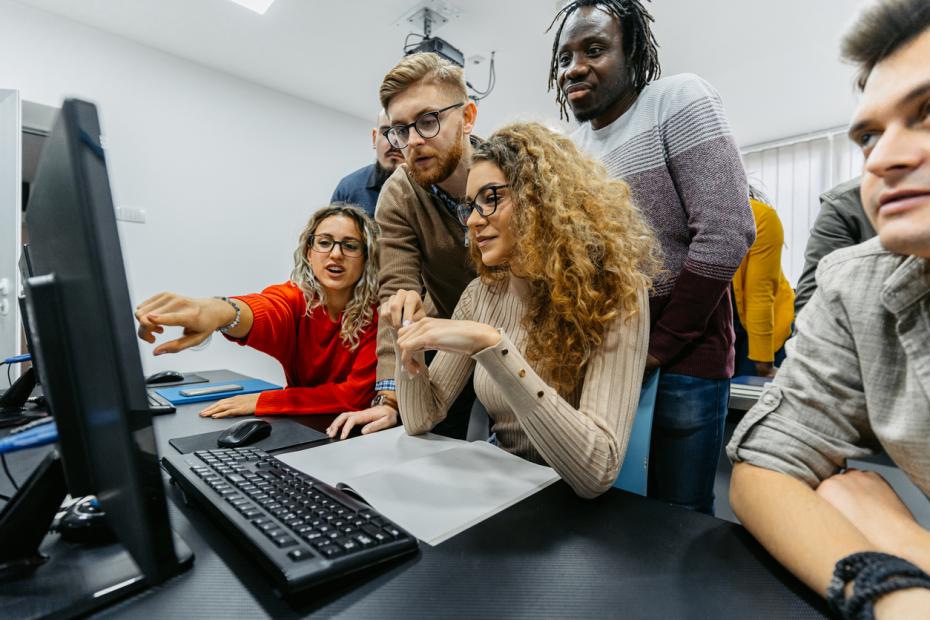
How to co-create learning resources with students
If you want to increase the impact and engagement levels of your learning resources, involve students in every step of the development process, argues Lauren Aspery

You may also like
Popular resources
Nobody knows what students want better than the students themselves. If you want your learning resources to be used and appreciated, involving students in your resource-development process can significantly increase their impact. By listening to the student voice, you can ensure the work you’re doing is worth it and be reassured that you’re on the right track.
At Newcastle University library, we’ve been running a student-led project since 2022 called Bridging the Gap, which brings together our Education Outreach and Academic Skills teams to create online study skills resources to support students in the transition from A-Level studies to university.
It’s a new way of working for us, but it has been an incredibly rewarding experience and is now standard practice. Our resource-development cycle is centred around student checkpoints, from getting their initial input right through to their final feedback. But it’s not just about including student input for the benefit of the resources. It’s also about providing an opportunity for students to become equal and valued members of our team, even delivering the resource content.
Involving students in your work can seem daunting when you’re in a small team managing a large workload. And it’s certainly a longer process, but the benefits far outweigh the challenges. This is how your resource-development process can, and should, include students.
Get to know your audience
Often we create learning resources when we have the time or have a certain quota to meet. We trust our experience and expertise when deciding what we should do and how we should do it. Although our instincts are probably right, do we really know what students need? The answer is, possibly not.
For our project, we began by slowing down and turning to student focus groups to identify the support they needed when transitioning to university. We did the same with A-Level students, backing this up with interviews with teachers and academics. In doing so, we could plot our road map in a meaningful way, prioritising the content we could really say students needed. And although it did match some of our own assumptions, we gained new insights we hadn’t considered before, such as students needing support with how to optimally use Microsoft Word and Excel for their studies.
Students as equal partners
If you choose to involve students in your work, it’s important to include them from the outset. In our resource-development process, we involve students in planning meetings where we brainstorm ideas. Their voices are as important as the staff members’ in the team. Students are involved as equal partners and are expected to contribute just as much. Placing trust in your students ensures they are more likely to contribute actively.
- From cohort to community: how to support student-led initiatives
- Self-directed learning is becoming the forgotten ingredient in HE
- Co-creating with students: practical considerations and approaches
Edits and feedback
To complete our resource-development cycle, we always return to our students. The students in our project team feed back on drafts, from scripts for videos to quiz questions. We allocate all work via a project-management tool called Teamwork, where team members can see what everyone is working on. By making the process transparent and setting our students clear tasks, we ensure they feel involved while meeting project deadlines.
Once we have a completed resource, we get a broader perspective on the subject matter and the way it is delivered through focus groups. Instead of traditional, conversational focus groups, we hold user-testing workshops where students review the resources independently and feedback via an electronic form. This means students can feed back anonymously and we are able to gather more data to guide any changes that might be required.
Have students deliver content
So much higher education content is formal in tone and delivered by lecturers, which we’ve learned can be off-putting for students. Based on this feedback, we opted for a student-facing approach. Featuring students in audio-visual resources instantly makes them more relatable and engaging.
Our resources are accompanied by a student blog, providing a wraparound student voice. You want key stakeholders, colleagues and conference attendees to know your work is student-led, but don’t forget about letting students know that too. By providing relatable content alongside our resources, we reassure users that they really will benefit from them.
What we’ve learned
Every project is different, but this is what we’ve learned from making our resource-development process student-led:
- Planning is crucial. Gathering input from a one-off focus group is one thing, but to involve students in a project from start to finish can be challenging. By getting meetings in their diaries long in advance, you can almost guarantee better attendance and engagement.
- Communication is key. To successfully include students in your work, it’s important to take the time to stay in touch and give them a named contact. Let them know what you’re doing and, crucially, why.
- Be open to change. Recognise that this process isn’t easy. Take a trial-and-error approach. Start small and increase students’ involvement over time.
- Have honest conversations. Whether you’re working on a large project or completing a small-scale piece of work within your team, take the time to reflect on what has or hasn’t worked. Allow your students the space to share how they feel.
- Give it a go. Ultimately, if your aim is to create learning resources for students, involve them wherever you can.
Lauren Aspery is a the project coordinator for Bridging the Gap at the Philip Robinson Library at Newcastle University.
Newcastle University is on the shortlist for Oustanding Library Team at the Times Higher Education Awards 2023 #THEAwards. See the full list of shortlisted candidates. Winners will be announced at a ceremony on 7 December in Liverpool.
Academics and university leaders from across the UK and Ireland will come together that week at THE Campus Live UK&IE to talk about institutional strategies, teaching and learning, the student experience and more. Join us for this two-day event in Liverpool.
If you would like advice and insight from academics and university staff delivered directly to your inbox each week, sign up for the Campus newsletter.


